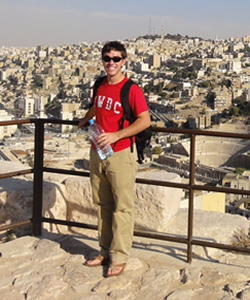
Nick Shaker
Nick Shaker (C'12) graduated from Georgetown College in 2012 with majors in Arabic and English. He participated in the Berkley Center's Junior Year Abroad Network while studying in Amman, Jordan during the 2010-2011 academic year.
Religion constituted a significant portion of my childhood. My family went to church every week and prayed before meals and bed. Being Catholic was a major part of my identity, but my entire concept of being religious changed when I arrived in Jordan. Ninety-two percent of Jordanians are Sunni Muslim, 6 percent are Christian, and the other 3 percent are Shi’'a or Druze. There is no population of people identifying as agnostic, atheist, or without religion. This came as a major surprise, especially since I come from a city where less than 40 percent of residents identify with a specific religious organization. However, soon after my arrival I learned that this demographic is true and apparent in daily life.
To start, Arabic speakers employ religious phrases frequently in their everyday speech. When I tell a taxi driver my destination, he responds “"God willing.”" When my professors ask how I am, I respond “"Thanks be to God."” And at the top of many car windshields and over many doors are the words “"in the name of God"” or “"what God wills."” These examples show that religion infiltrates even the most mundane aspects of daily life.
Along the same lines is the music choice of many cab drivers. When I get into a cab and the radio is on there is a small chance that music is playing. Most likely the radio is playing readings from the Qur’'an. If I am in a cab when the call to prayer starts, I can expect that my cab driver will turn off whatever music is playing, change the station to the broadcasting call to prayer, and all talking will cease for five minutes while the prayer takes place. There may be no conversation of religion in the cab before or after this event, and the driver may be my age, and wearing a Rolling Stones shirt, but religion ensues. This all goes to show that religion plays a larger role in people’'s routine lives here than in the United States.
Another example of this is my host family. My host parents are evangelical Christians, representing a small sect of the Christian minority. When I first learned this I expected them to be seriously religious like most evangelicals I know, but nothing could have prepared me for the extent of their devotion. Every piece of art, every calendar, every notebook, and book in their house has to do with Jesus. When the television is on, it is tuned to religious programs, most of them discussing Islam and Christianity. Adding to this, most of my conversations with them revolve around Christ or Christian theology. When I came home from my first day of classes they asked my professors' family names to see if they were Christians or Muslims. It is clear that religion is the dominating factor in these people’'s lives.
At first, this obsession with religion really turned me off, but with further meditation, I am learning to accept it. I realize that we do the same thing regarding other facets of identity. In America we obsess over political leanings, sexual orientation, race, and ethnic origin. These would be equally important in Jordan except that politics are usually aligned with religion, racial, and ethnic diversity are somewhat non-existent, and sexuality is not discussed. In essence, religion seems to be one of the only major differences between people here. Although there are varying degrees of diversity, the easiest way to distinguish people here is by their religion. Because of this, it is what makes people different from or the same as others and occupies a huge place in their lives and their perceptions of others.
I am not sure whether these strong social associations follow from strong faith or the other way around. Either way, Jordanians take their religion very seriously both in social and religious senses. From public displays like car décor, to private observations like dinner conversation, and church going, religion plays a major role in Jordanian life. Due to Jordan’s somewhat homogeneous population, religion emerges as the major divider and therefore strengthens its importance. Witnessing religious life in Jordan has made my childhood seem completely secular and forced me to reevaluate the standard American idea of identity.